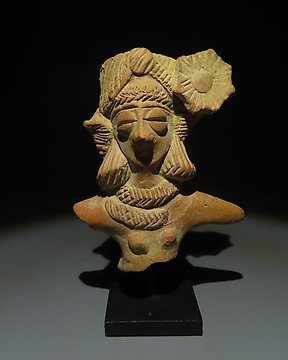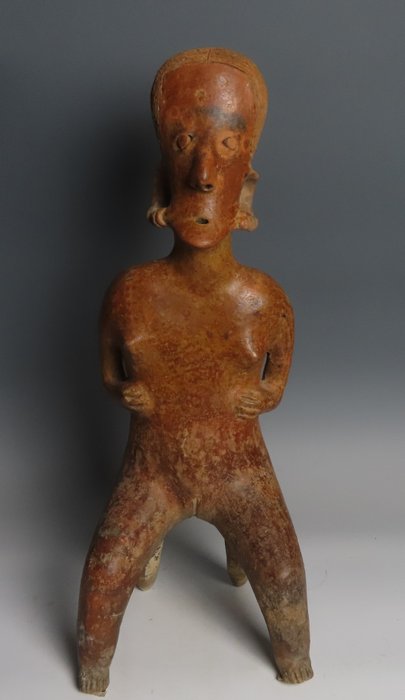
Harappa Terrakotta Női istenség törzse. Kr.e. 2500-1900. 8,5 cm H. (Nincs minimálár)
Nr. 84324461

Nr. 84324461

Female Figure
Nayarit, West Coast of Mexico
200 – 600 AD
Terracotta
Height 56 cm.
With TL test.
PROVENANCE: Private Collection R.G., Lambertville, New Jersey, USA. With Spanish Export License.
CONDITION: In a good state of preservation. Restoration in the lower part, difficult to appreciate it due the quality and professionalism of the restoration.
DESCRIPTION:
The culture Nayarit developed on the western coast of Mexico, 500 BC – 500 AD, in a tropical zone of rainforests and abundant rivers, streams and lakes, as well as mosquitoes, alligators and poisonous snakes.
As the vast majority of our information about this culture comes from pieces held in private collections, it is not possible to describe their economy.
Nayarit ceramic pieces were made using a variety of production and finishing techniques. Negative and positive painting were often used for decoration, although representations were very dissimilar. Human images are quite life-like, but body shapes are often elongated or stylized to achieve greater expression. These figures do point to some aesthetic aspects of Nayarit culture, such as cranial deformation, the use of nose ornaments, pendants and necklaces, and ornate clothing. Notable figures include females holding ceramic vessels, sitting down, crouching, or reclining. Animal representations are rare, but those that have been found often are of dogs.
Little is known about the Nayarit’s social organization, but they are thought to have lived in local chiefdoms. Shamans held positions of respect in Nayarit culture.
Nayarit elites were buried in complex tombs consisting of a chamber at the bottom of a deep pit. Family members were buried in the same chamber, accompanied by an array of grave goods that might include ceramic vessels and sculptures. Of particular note are the Nayarit’s statues of warriors and dogs that were left to protect and guide the deceased to the afterlife.
The Nayarit people maintained close ties with the neighboring Jalisco and Colima people, as shown by the many similarities among their ceramic traditions and burial rites. The present-day Huichol people are the descendants of the ancient Nayarits. Aspects of their culture of origin are especially visible in the heavily symbolic figurines they produce.
With Thermoluminiscence test.
BIBLIOGRAPHY:
-AA.VV, Sculpture of Ancient West Mexico, Los Angeles County Museum of Art, 1970.
-AA.VV, Trésors de la céramique précolombienne dans les collections Barbier-Mueller, 2003.
-VON WINNING, Hasso, Pre-Columbian Art of Mexico and Central America.-
-BUTTERWICK, Kristi. Heritage of power: ancient sculpture from West Mexico. The Andrall E.Pearson family collection. The Metropolitan Museum of Art, New York, 2004.
Notes:
The seller guarantees that he acquired this piece according to all national and international laws related to the ownership of cultural property. Provenance statement seen by Catawiki.
The seller will take care that any necessary permits, like an export license will be arranged, he will inform the buyer about the status of it if this takes more than a few days.
The piece includes authenticity certificate.
The piece includes Spanish Export License.
Hogyan vásárolhatok a Catawiki-n?
1. Fedezzen fel valami különlegeset
2. Tegye meg a legmagasabb licitet
3. Fizessen a biztonságos és védett rendszert használva